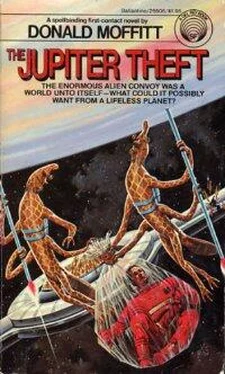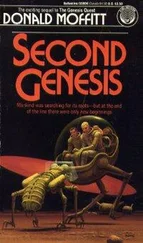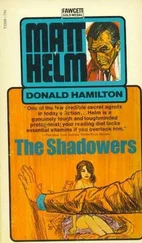His accomplishment earned him a reprieve. It made conversing a lot easier for the Cygnans, for one thing, and that rekindled their interest. They didn’t have to stop to figure out what Jameson meant when he interpolated a broken chord, and they didn’t have to repeat things for him endlessly; the Moog’s play-along attachment taped them the first time, and the Cygnans could go about their business while Jameson devoted himself to memorizing word lists.
They didn’t even make him return to his cage. Instead, they let him sleep in a small storage room adjacent to their office or workshop, or whatever it was, and work on his vocabulary while they were busy. During their frequent absences, he was allowed to wander through the workshop, as if he were a trusted pet. Among the looted human artifacts he found clothing and toilet articles, and soon he was able to get warm again and clean himself up. The aproned assistant brought him his meals at regular intervals: more frozen food from the freezer and, as time went on, unfamiliar stuff that the Cygnans evidently had learned to synthesize. Most of it was an unappetizing mush, but it didn’t make him sick. At least he wouldn’t starve when human supplies ran out.
To Jameson’s immense relief, learning the Cygnan language turned out to be easy. The structure, such as it was, was positional. He was able to get along fairly well simply by piling words on top of one another, as you could do in Chinese.
He remembered something one of his language teachers on Earth had told him: Sophisticated languages tend to dispense with grammar. Languages of primitive cultures, like Eskimo or Hottentot, have far more complex a structure than highly evolved languages like English or Chinese. The Cygnans, who had been wandering through space for untold millennia, must have a far older civilization than man.
Their language had been simplified. Given time, Jameson could have taught Mike Berry or any other competent amateur musician to play back Cygnan “words” by rote on the Moog’s modified keyboard, or punch in his programmed phrases. But Mike didn’t have absolute pitch, so he could never have understood the Cygnan’s replies.
The Cygnan language was simple, all right. But nobody in the crew except Jameson could possibly have understood it.
“Is this a little Jameson?”
At least Jameson assumed the word was “little” or something close to it. It fit the context and contained, within a cloud of embellishments, the set of phonemes that denoted something that was small in size or a model for something larger.
“No,” Jameson said, his fingers flashing over the keyboards of the Moog. “It is an animal.”
He had gotten to that point of fluency where his fingers thought for him in Cygnanese. It must be the same, he imagined, for people who habitually communicated in deaf-and-dumb signals: language without vocalization, but language nevertheless.
“Yes, but is this the animal that (tootle-tootle-peep-peep-peep) Jamesons?”
His mind had automatically translated the piping sounds into idiomatic English—all but the (tootle-tootle-peep-peep-peep). It sounded a little like the word for “produce” and a little like the word for “consume” and a little like the ideogram for putting together the parts of something. It was another of those Cygnan ambiguities that Jameson could never seem to get the hang of.
The animal in question was a small bedraggled kitten that crouched on one of the oval pads of Triad’s desk, almost too weak to move and certainly too frightened to jump down. It was tiny and feather-light, with matted gray fur, and its ribs showed pitifully. It had spunk, though. It hissed at Jameson or the Cygnans when they got too close, showing a pink tongue and little needle teeth. Where the animal had come from was a mystery. Tetrachord and Triad had disappeared for about twelve hours and had returned in a state of high excitement, lugging triangular containers. The kitten came out of one of the containers.
“I do not understand,” Jameson said cautiously. His fingers hammered away at the keys. “What is (tootle-tootle-peep-peep-peep) ?”
He hoped he’d got that right. Sometimes the tiniest transposition of a tone led to wild misunderstandings, which had caused his problem with the concept of many Jamesons. The Cygnans still vehemently denied that there was a class of Jamesons, but they freely used the idea of a Jameson to refer to humans. Jameson couldn’t understand the distinction.
He received no reply. The Cygnans acted displeased with him. But all he’d done was repeat the word that Triad had used. Or had he? He felt like a small boy who has unwittingly used a dirty word.
He thought furiously. He didn’t dare risk having the Cygnans break off the conversation, as they frequently did when things got difficult. What had Triad asked him? One component of the ideogram was “to consume.” Was she asking him if kittens were parasitic on man? They were obviously too small to be predators.
He risked it. He pointed at the swollen parasite that swung between Triad’s hind legs.
“Is this the animal that (tootle-tootle-peep-peep-peep) Triads?” he asked.
The reaction was swift and startling. Tetrachord untwined himself from his perch and made a savage rush at Jameson. Jameson shrank back, alarmed. These mock rushes seemed to be a Cygnan reflex to anything threatening—either physical or intellectual—but they were scary nevertheless. Tetrachord darted a long neck at Jameson, making hissing sounds. The spiked tongue flicked in his direction.
Triad’s reaction was different. The smaller Cygnan shielded the parasite from view with two hands. The orange orifice at the end of the tail, which often revealed itself partially when the Cygnans were relaxed or doing something pleasurable like eating, closed itself up purse-tight. Triad assumed the posture which seemed to signify self-protection or embarrassment.
Desperately Jameson assumed the submissive posture. It was the Cygnan form of apology. He turned his back to Tetrachord and crouched, holding himself perfectly still.
Mollified, Tetrachord returned to his perch. When Jameson thought it was safe he stood up again and went to the desk. He picked up the gray kitten. It vibrated against his chest, all skin and bones.
He walked over to the locker containing the supplies of human food that he’d scrounged from the Cygnans’ loot. He rationed it out to himself whenever he needed a change from the synthetic mush the aproned assistant dished out to him.
He found a can of condensed milk and poured some of it in a bowl. He set the kitten down on the floor in front of it. The kitten began avidly to lap it up.
The two Cygnans watched with mounting interest. “The animal would not eat the human food we gave it,” Triad reported. “It would only drink the water.”
A few circumspect questions got Jameson the information that the kitten had refused offerings of rice and wingbean paste from the ship’s stores. They hadn’t tried giving it meat.
“How long,” he asked carefully, “has it been since this animal has eaten?”
He got an answer that it was equal to the length of one of the Cygnans’ active periods. It was the only unit of time he had succeeded in establishing so far. The kitten hadn’t eaten for eight or nine days; that was the closest he could figure.
“Where did you find the animal?” he asked.
He wondered who in the crew had managed to smuggle a kitten aboard ship and keep it hidden for all those months. No—not a kitten. A mother cat. Pregnant. Wait a minute! What was the gestation period of a cat? Only a couple of months! That was impossible. The trip to Jupiter had taken five months, and the kitten couldn’t be more than a few weeks old.
Читать дальше












